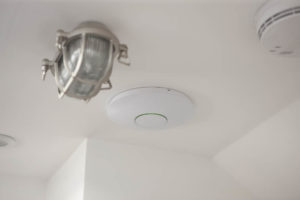
Boost your wireless capabilities with a wireless access point, expertly installed by Aerial Services.
Many of us take wireless internet for granted, assuming that all locations will provide fast and reliable internet access. The process for getting large commercial buildings and communal settings online is so much more complicated than plugging in a residential router. If you need to extend your wireless network in your home or business, Aerial Services can help.
Wireless Access Points Explained
There is the assumption that all routers offer wireless internet access or Wi Fi. This isn’t the case, but most routers can be modified to provide fast and reliable internet access. Large buildings, offices and blocks of flats often need specialist provisions to be able to provide workers, residents and visitors Wi Fi access. This is where wireless access points come into play.
A wireless access point connects to a router using an Ethernet or data cable. The wireless access point will then transmit and receive data over the 2.4Ghz or 5Ghz frequency, just like a wireless router. This allows wireless devices such as laptops and mobile phones to connect to the Local Area Network (LAN) and the internet.
Do I Need A Wireless Access Point?
 Not all situations call for a wireless access point. If you have a router that does not offer Wi Fi capabilities, then a wireless access point will be required to get you online from a mobile device. A wireless access point can also be helpful to boost the Wi Fi signal to “black spots”. If your internet connection struggles in certain parts of your house, your WiFi signal could be to blame.
Not all situations call for a wireless access point. If you have a router that does not offer Wi Fi capabilities, then a wireless access point will be required to get you online from a mobile device. A wireless access point can also be helpful to boost the Wi Fi signal to “black spots”. If your internet connection struggles in certain parts of your house, your WiFi signal could be to blame.
Common signs that you need a Wireless Access Point in a residential property include poor internet connection, frequent and prolonged “buffering” and slow loading times. We have all become accustomed to fast and reliable internet and we also rely on the internet to carry out more intensive tasks. If you rely on the internet to stream your entertainment, for example, then slow download speeds and buffering will not be acceptable.
Wireless Access Point or Range Extender?
A common question we hear about wireless access points is whether or not a range extender would be better. A range extender works by picking up a strong signal and amplifying it further than the main router. So, in a four-storey building, if your router is placed in the basement, a range extender on the ground floor could help to eliminate Wi Fi black spots on the second floor.
A range extender serves a different purpose, as it cannot provide a wireless connection where there isn’t one. A range extender can only amplify what is already there. So, if your current router does not offer Wi Fi capabilities, a range extender cannot help.
Can I Install Multiple Wireless Access Points?
Multiple wireless access points are possible, but there is a limit to the benefit that adding more access points can bring. By adding more access points, you are splitting the allocation of bandwidth. If your internet connection is unable to keep up, you will simply be offering a poor internet connection to more devices.
The aim of a wireless access point should always be to amplify reach without diminishing the quality of the connection. When adding multiple wireless access points, particularly in residential areas, it’s worth ensuring that it offers 5Ghz frequency coverage. The 2.4Ghz frequency is the most commonly used for residential broadband, which means it is a very crowded frequency. By utilising the 5Ghz frequency, you may find this performs better.
Multiple wireless access points should also employ high-speed switchers. These will allow you to move through the building and pick up the strongest signal available.
Common Questions About Wireless Access Points:
If you have questions about the following points, get in touch with Aerial Services on 0207 582 8888. We cover London, Hemel Hempstead and Watford. We can provide bespoke support and expert advice on all TV, satellite and wireless enquiries.
-
How do I set up a wireless access point?
-
What is the best wireless access point?
-
What is the difference between a router and a wireless access point?
-
Does a wireless access point reduce speed?










